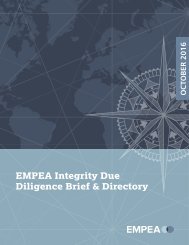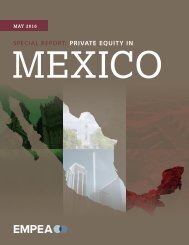Create successful ePaper yourself
Turn your PDF publications into a flip-book with our unique Google optimized e-Paper software.
Onshore Options for Africa-focussed<br />
Investment Funds and Vehicles<br />
FINAL DRAFT – January 2015<br />
Prepared for FSD Africa<br />
by<br />
Z/Yen Group Limited | 90 Basinghall Street | London EC2V 5AY | United Kingdom<br />
Telephone: +44 20 7562-9562 | Facsimile: +44 20 7628-5751 | www.zyen.com<br />
1. INTRODUCTION<br />
1.1 Defining Financial Centres<br />
The definition <strong>of</strong> a financial centre is bound up in the definition <strong>of</strong> a city. We can start by observing that financial centres are<br />
cities or districts <strong>of</strong> cities where finance is conducted. However, the definition <strong>of</strong> a city is problematic, as anyone who has<br />
tried to compare city populations knows. Is Paris bigger than London? Did we mean the core city, perhaps the medieval<br />
walls, the city as defined by political boundaries, the greater metropolitan area? In certain cases, such as <strong>of</strong>fshore centres<br />
like the Cayman Islands, the financial centre is really just the jurisdiction.<br />
Likewise, the definition <strong>of</strong> finance is problematic. All cities have financial transactions. Is a shipping transaction finance?<br />
Paying for fuel? When does a shipping transaction become just finance? Are we talking about transactions that are wholly<br />
financial? Funding a vessel, insuring it? So much finance is conducted electronically that one might be able to claim that<br />
server farms located anywhere are financial centres.<br />
Z/Yen’s definition—“financial centres are places with strong concentrations <strong>of</strong> financial pr<strong>of</strong>essionals and their firms.” It’s the<br />
people that matter.<br />
Financial centres funnel investment toward innovation and growth. Vibrant, competitive financial centres give cities economic<br />
advantages in information, knowledge and access to capital. A strong financial centre, whether domestic, niche, regional,<br />
international or global, connects the wider economy to the global financial community. Cities that are part <strong>of</strong> the global<br />
financial network gain from global trade and growth. Inward and outward investment opportunities increase the wealth <strong>of</strong><br />
cities that have financial centres and the wealth <strong>of</strong> their citizens.<br />
‘Traffic’ between the domestic economy and the global financial community is critical to national economic performance.<br />
The key function <strong>of</strong> the domestic financial community is not its ability to service the domestic economy’s needs domestically,<br />
but rather its ability to service the domestic economy’s needs wherever and however they are best serviced. But after a point<br />
a well functioning financial centre attracts global financial transactions in its own right, and this confuses matters.<br />
<strong>Conduits</strong> <strong>of</strong> <strong>Capital</strong> – Onshore Financial Centres and Their Relevance to African Private Equity<br />
| 115





